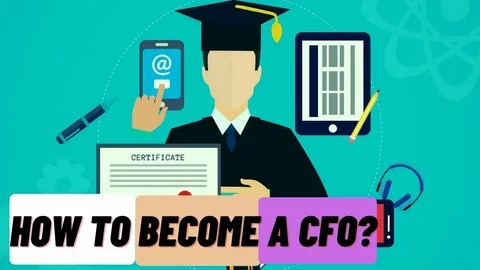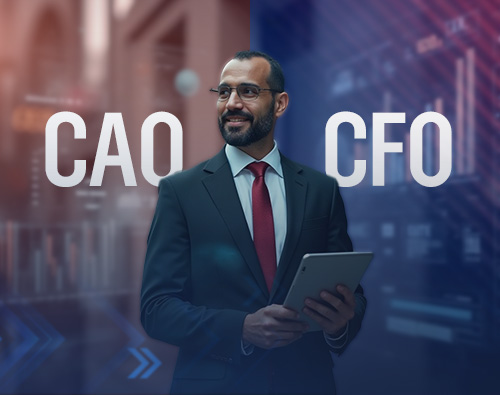What Degree and Professional Certifications Do You Need to Become a CFO?

Accounting
Imagine you’re sitting in the finance department of a growing company daily reports, monthly forecasts, investor meetings. Every number on your dashboard tells a story: revenue growth, cash flow gaps, margin pressures. Suddenly, the CEO turns to you and asks,
Can we expand into a new market this quarter?
What will our cash position look like if we launch a new product line?
Can we secure funding for next year’s strategic plan?
At that moment, you realize this is not about bookkeeping anymore. It’s about financial leadership. It’s about becoming a CFO (Chief Financial Officer) the strategic architect who translates data into decisions, risk into opportunity, and vision into measurable growth.
But how do you get there? What education and professional certifications pave the way to the top financial seat? Let’s explore the academic journey and global credentials that shape tomorrow’s CFOs.
Step 1: The Educational Foundation – What Degree Do You Need?
Before you pursue the executive seat, you need a solid academic foundation. Most CFOs start with a Bachelor’s degree in Accounting, Finance, Economics, or Business Administration.
This degree teaches you:
- The principles of financial reporting and analysis
- Core concepts in corporate finance
- Basics of auditing, taxation, and budgeting
If you aim for international exposure or strategic roles, a Master’s degree (MBA or M.Sc. in Finance) can elevate your profile offering deeper insights into leadership, corporate strategy, and investment decision-making.
Step 2: The Power of Global Certifications
In today’s competitive market, degrees alone are not enough. The journey to becoming a CFO demands professional certifications that validate your technical expertise, analytical skills, and leadership vision.
Here are the top certifications every aspiring CFO should consider:
1. CMA (Certified Management Accountant)
- Focus: Strategic planning, cost management, and decision analysis
- Ideal for: Professionals aiming to master management accounting and performance measurement
- Why it matters: CMAs are known for bridging the gap between operations and strategy a vital skill for CFOs
2. CPA (Certified Public Accountant)
- Focus: Accounting standards, audit, and taxation
- Ideal for: Those seeking mastery in financial reporting and compliance
- Why it matters: CPAs bring credibility and strong technical grounding in governance and regulatory frameworks
3. FMVA (Financial Modeling & Valuation Analyst)
- Focus: Financial modeling, valuation, forecasting, and Excel mastery
- Ideal for: Analysts, finance managers, and CFO-track professionals
- Why it matters: FMVA equips you to build financial models that drive decision-making, making you the go-to expert for strategic scenarios
4. CFA (Chartered Financial Analyst)
- Focus: Investment analysis, portfolio management, and corporate finance
- Ideal for: CFOs in investment-heavy industries
- Why it matters: CFA holders bring deep analytical and valuation expertise, crucial for mergers, acquisitions, and fundraising
Step 3: The CFO Mindset – Beyond Numbers
Becoming a CFO is not just about technical mastery it’s about developing a strategic mindset.
A successful CFO must:
- Lead cross-functional teams and align finance with business goals
- Manage risk and cash flow to sustain growth
- Communicate financial insights in a clear, decision-oriented language
- Leverage digital tools like Power BI, ERP systems, and automation to drive transformation
To nurture this mindset, professionals often enroll in executive finance programs, leadership bootcamps, or mentorship tracks bridging the gap between analysis and action.
Step 4: Stay Ahead with Continuous Learning
The finance world evolves daily from IFRS updates to AI-driven analytics.
Top CFOs remain lifelong learners, staying current with:
- Emerging fintech innovations
- ESG reporting and sustainability
- Data-driven financial planning
Combining continuous education with experience across industries (construction, retail, tech, or FMCG) creates the well-rounded vision every CFO needs.
Final Thoughts: Your Journey Starts Today
The path to becoming a CFO is not just a career choice it’s a strategic evolution.
Start by building your academic foundation, strengthen it with recognized certifications (CMA, CPA, FMVA, CFA), and sharpen your leadership and modeling skills.
If you’re ready to unlock your CFO potential, explore exclusive financial training programs designed to equip you with the tools, skills, and mindset to lead.
📞 Contact 360 Business Partners today to design your learning path:
📧 info.egy@360business-partners.com
🇪🇬 +20 15 69189796
🇸🇦 +966 59 935 4746
🌐 360business-partners.com/ar
Related Articles
Explore Articles on Finance, Accounting, and Career Growth


